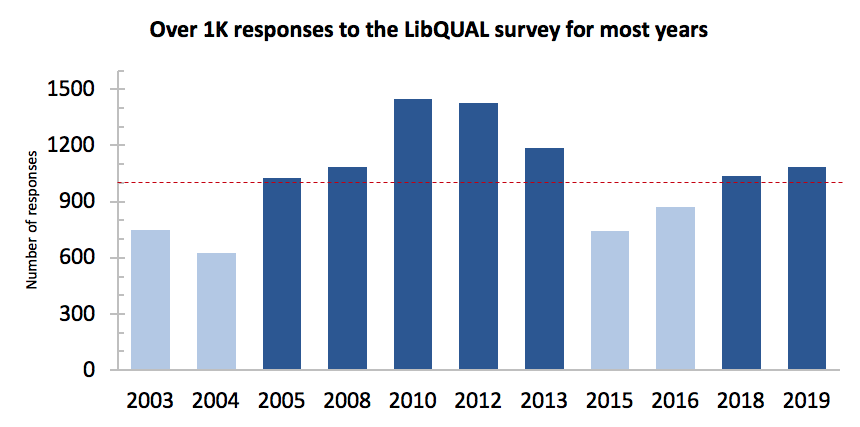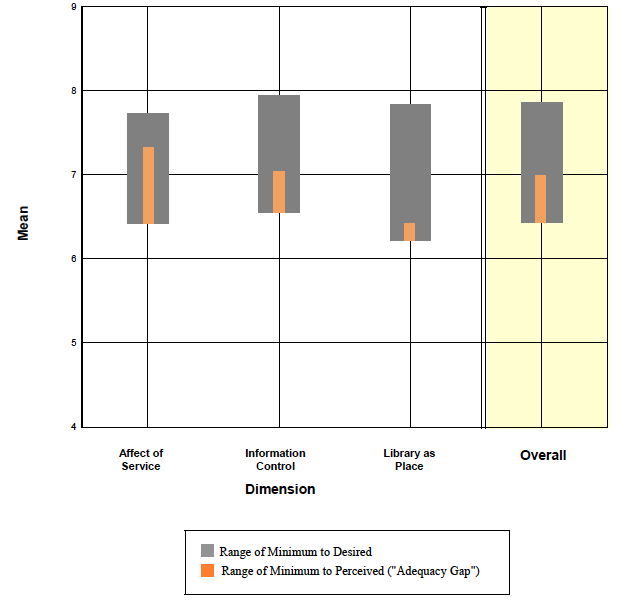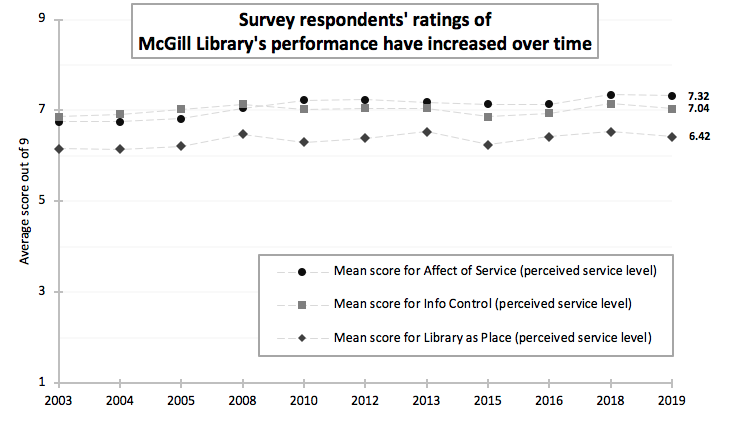Over the past two decades, McGill Library has administered the LibQUAL+ survey on a quasi-annual basis to assess satisfaction with collections, services, and spaces. After survey results are analyzed, we act to make needed improvements. Increasing the number of our e-books and other online materials, creating additional study areas, implementing the Waitz occupancy service to help students find study spaces in McLennan-Redpath, and progressing towards a new Library complex, Fiat Lux, are just some ways in which survey feedback has yielded tangible results. We have received 11,288 responses to the LibQUAL+ survey since 2003, one of the earliest distributions of this survey at McGill.
LibQUAL+ explained
The LibQUAL+ survey is a standardized library survey, provided by the Association of Research Libraries, which has been and is being used by different types of libraries across the world to determine users’ perceptions and expectations of the library. It asks respondents to answer questions about three areas:
 1. their interactions with library staff, called Affect of Service in the reporting of LibQUAL+ results;
1. their interactions with library staff, called Affect of Service in the reporting of LibQUAL+ results;
 2. their ability to find and access needed books, journals,
2. their ability to find and access needed books, journals,
and other materials in print and electronic formats,
also known as Information Control in LibQUAL+ reports; and
 3. their use of physical spaces, called Library as Place.
3. their use of physical spaces, called Library as Place.
The majority of questions consist of rating statements on a nine-point scale, with one being the lowest score and nine the highest. Respondents are asked to rate each statement three times, i.e., to provide one rating for the minimum service level the respondent finds acceptable, another rating for the level of service personally desired, and the last rating for the level of service the respondent believes or perceives is currently being provided.
Three ratings provide context for interpretation since the rating a person gives for a service received is placed in a range of that person’s expectations; it is not just a single number. Furthermore, the gap between the minimum and desired levels of service helps identify which services are the most important to library users. For example, below is the range of average scores for McGill Library from the 2019 LibQUAL+ survey. The box plot shows that respondents are most satisfied with interactions with library staff (i.e., Affect of Service) since it has the smallest gap between perceived and desired service levels.

Caption: A graph from the Association of Research Libraries’ results report for the 2019 LibQUAL+ survey distributed at McGill.
Findings over the years
The questions in the LibQUAL+ survey have stayed the same over the years, which allows us to make comparisons. Some findings are:
- a general increase in LibQUAL+ scores from 2003 to 2019 for respondents’ perceptions of McGill Library’s service performance in all three areas addressed by the survey (i.e., Affect of Service, Information Control, and Library as Place)
- respondents’ expectations of Library as Place have increased at approximately the same pace as their perceptions of McGill Library’s performance in this area since 2003, which means that respondents keep setting the bar higher at the same time as they acknowledge our improvements in this area; compared to other services asked about in the survey, undergraduate and graduate student respondents have indicated the strongest growing desire over time for quiet and group study spaces in McGill Library branches that are comfortable, inviting, and inspiring
- the gap between perceived and desired service levels decreased the most for these three survey statements from 2003 to 2019 or, in other words, these are the top three statements for which McGill Library has moved the closest to meeting respondents’ expectations over time:
- Print and/or electronic journal collections I require for my work
- The printed library materials I need for my work
- Employees who are consistently courteous
In addition to asking for ratings, the LibQUAL+ survey contains an open-ended question where respondents can enter their comments about library services. Hundreds of comments are supplied each time the LibQUAL+ survey is distributed. These valuable comments complement respondents’ ratings in the survey by providing more detailed information about what is working well and which areas need improvement.
In winter 2019, an additional open-ended question was included in the LibQUAL+ survey that asked respondents to “Please share with us an example of how Library collections, services, or spaces had an impact on your work. What did the Library enable you to do?” Almost 550 individuals, half of the survey respondents, answered this question and described, in their own words, the impact of McGill Library’s collections, computers, furnishings, spaces, and staff on their work. The top five items mentioned as impactful were the Library’s: 1) collections; 2) physical spaces; 3) staff; 4) interlibrary loan and article/chapter scan services; and 5) workshops.
Below are some representative quotes from the responses to the 2019 impact question:
- “My research depends on the library resources almost entirely so every aspect of it – physical and digital holdings, staff, digital tools, databases – enable me to do my work.” – Assistant Professor, Faculty of Arts
- “Librarian [Name] met with me to answer questions I had about doing a systematic review and how to critically appraise articles. I can check out course textbooks on-reserve which saves me money. McGill computers allow me to do analysis on large datasets that I would not be able to do on my personal laptop.” – Graduate student, Faculty of Medicine
- “The library helps me to have access to modern papers and research papers which are not free otherwise, and that really helps me with my research.” – Graduate student, Faculty of Engineering
- “For even short papers, I access library resources to ensure that I have the best possible sources. This has allowed me to obtain high marks on papers.” – Undergraduate student, Faculty of Arts
- “I remain on campus for the entire day and the library is paramount in allowing me to have a space to be productive and access to the resources I need.” – Undergraduate student, Faculty of Agricultural & Environmental Sciences
- “I borrow books constantly from the library. I find the online catalogue very useful too, and the academic journal collection is amazing!” – Graduate student, Faculty of Arts
- “The primary role libraries have played in my undergraduate experience is to have given me quiet spaces where I can focus on studying alone and collaborative spaces where I can work with others. These spaces are my favourite places to study and they are where I learn best.” – Undergraduate student, Faculty of Engineering
- “The designated study areas — especially silent ones — have helped me succeed on my final exams.” – Undergraduate student, Faculty of Science
- “Different floors for different levels of studying helps to keep focused.” – Undergraduate student, Faculty of Management
- “The group study space is amazing. I’ve done lots of group projects in group study rooms. The library enabled me and my fellow students to do our projects efficiently.” – Graduate student, Faculty of Education
Invitation to participate in 2020
The LibQUAL+ survey will be available to a subset of the McGill community in March. Those selected to participate will receive an email invitation with a link to the online survey on Tuesday, March 10th, 2020.
As in the past, 25% of undergraduates and 35% of graduate students have been randomly selected this year to participate in the survey. Random selection ensures that everyone in the target population has an equal chance of being invited, and avoids biasing the results towards one particular group or excluding another. Therefore, the results are considered representative of the McGill population and can be generalized to everyone at a given time.
All academic staff and a random sample of support staff from selected faculties are also asked to participate each time, alternating between STEMM faculties one year and humanities, social sciences, law, and continuing studies faculties or schools the next year. STEMM faculties are being surveyed in 2020.
Your opinions matter to us. If you have been selected to participate, please make your voice heard by clicking on the survey link you will receive in your email inbox on March 10th. You may be one of the ten lucky winners of a random prize draw for $50.00 Le James McGill Bookstore gift certificates.

Caption: Seven out of the 10 lucky winners of the 2019 LibQUAL+ survey prize draw, next to the Trenholme Dean of Libraries Colleen Cook in most pictures. Three undergraduate students, four graduate students, two faculty members, and one support staff each received a $50.00 Le James McGill Bookstore gift certificate.
As the Assessment Librarian, I am constantly collecting information about the Library and am always interested in what others have to say about our services and spaces. I look forward to reading your responses to the LibQUAL+ survey. You are also most welcome to share your feedback with me at assessment.library@mcgill.ca.
Thank you for helping us improve!













Leave a Reply
You must be logged in to post a comment.